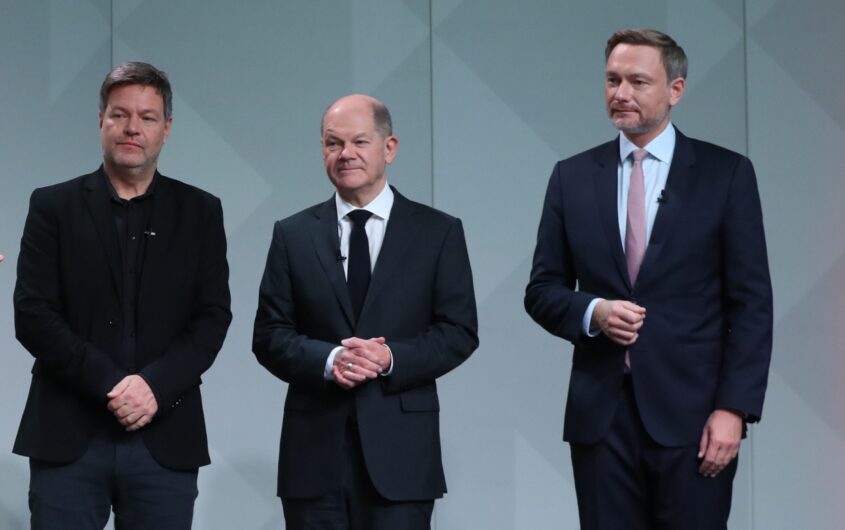
Sandro Halank via Wikimedia Commons
Back to Reason!

Andreas Freytag
Friedrich-Schiller-University Jena
Dr. Andreas Freytag is Professor of Economics at the Friedrich-Schiller-University Jena, Honorary Professor at the University of Stellenbosch, and Visiting Professor at the Institute of International Trade, University of Adelaide. He is also Director of G20 Trade and Investment Research Network. He is a DAAD/AGI Research Fellow in October and November 2023.
Dr. Freytag obtained his diploma from the University of Kiel and his doctorate as well as his Habilitation from the University of Cologne. He has published a number of books and articles in first-class peer-reviewed journals on economic policy, international trade policy, development economics, and international policy coordination. He contributes to blogs and for over ten years had a weekly column on wiwo-online, a German magazine.
During his time at the AGI, Andreas Freytag will focus on the substance and path of tightened transatlantic relations against the background of the systemic competition between the West and autocratic states. The latter comprise some emerging economies, including Russia and China. This escalation has geo-political and geo-economic consequences and makes it necessary to strengthen the ties between transatlantic partners as well as to reach out jointly to attract third countries to the Western values.
To maintain Western leadership in standard-setting as well as helping developing countries to enforce universal human rights and environmental standards, there needs to be a coordinated and broad-based strategy to (1) react to Chinese et al. attempts to define and set standards, which become binding for third countries’ companies. Similarly, (2) due diligence legislation may also be more effective if coordinated across the Atlantic. Although not in the center of analysis, another (3) aspect deals with the transatlantic trade relations as such, which are also in need of a revitalization.
This project focuses on the geo-economic aspects of systems competition although it is difficult to disentangle economic and political relations. It analyzes ways to intensify the transatlantic relations with the objective to maintain economic welfare as well as to position the Western partners better to counter autocracies’ attempts to gain influence in the world economy.
The Constitutional Court’s decision is an opportunity for a far-reaching political change. The Traffic Light Coalition should seize it.
This article originally appeared in German in WirtschaftsWoche on November 25, 2023.
Political scientist Karl Deutsch coined the phrase “pathological learning,” referring to a situation in which society is only willing to reform because the current situation cannot become any worse. Before that point, a government is unable to react and reform because it faces political or ideological opposition.
Applied to German economic policy, this reform backlog has basically existed since the introduction of Agenda 2010. It includes issues such as bureaucratization, a lack of digitalization, untransparent tax policy, a social policy that fails to provide incentives, an unsustainable pension policy combined with an urgent shortage of skilled workers, inadequate public investment, and a climate policy that is expensive because of its inefficiency and ineffectiveness.
The traffic light coalition (Social Democrats, Greens, and Free Democrats) has largely inherited these problems (and both intensified and mitigated them) and must now solve them in a period of permanent geopolitical crises and necessary transformation in many areas.
So far, it has not been able to do so—for several reasons: The Social Democrats cannot shake their skepticism of companies and need to accommodate aggressive trade unions. The Greens, whose leaders are less and less convinced that climate protection is best achieved through command-and-control policies, have a capitalism-critical base and fundamentalist climate activists such as Deutsche Umwelthilfe breathing down their necks. And the Free Democrats seem to feel beholden to a number of lobby groups, which is why they only half-heartedly support their preferred model of climate protection—the market solution. At the same time, they cannot sacrifice the debt brake without committing political suicide.
The apparent emergency caused by a lack of funds can be a driving force for reform. We must leave the path of pathological learning.
The Federal Constitutional Court’s ruling of November 15, prohibiting the transfer of an extraordinary debt stock dedicated to COVID-19-related policies to a use for climate policy, offers the coalition partners an opportunity to finally free themselves from their ideological burdens and the influence of lobby groups. The apparent emergency situation due to the lack of funds for further billions in subsidies and politically and socially motivated gifts could turn out to be a driving force for reforms for which the coalition does not have to take responsibility itself, but for which it can blame the Constitutional Court.
If climate policy cannot be pursued with ever-increasing subsidies, we must switch to a market solution and thus to effective climate protection. Real scarcity prices for CO2 emissions generate revenues that can be used for investments and compensation of citizens particularly hurt by carbon prices. If there is no money for pensions, we must finally tell people the truth and make the retirement age more flexible. If companies cannot be kept in the country with subsidies, we can finally tackle a real tax reform, which may generate lower tax revenues in the short term but can lead to more growth and rising tax revenues in the long term. If lengthy administrative procedures are driving companies away and the government can no longer entice them to stay with subsidies, administrative procedures must finally be sped up. In short, the ruling is an opportunity for focus and reason!
There are many examples of such forced reforms in the past—think of the UK in the late 1970s and Australia and New Zealand in the first half of the 1980s. In Australia and New Zealand, it was left-wing governments that implemented supply-side and more market-oriented reforms after years of structural problems. In this respect, it would be nothing new for an SPD-led government to do the same here—after all, the Social Democrats and Greens reacted surprisingly robustly to the Russian attack on Ukraine, and they are preparing to take a similarly robust stance on migration policy. It is only a small step to a rational economic policy. And in any case, it seems vital for the FDP to finally show its free-market colors.
Unfortunately, the coalition partners have not yet grasped this opportunity. Instead, the ruling caused a stir in Berlin: the planned spending on climate protection is no longer possible; the coalition has lost its raison d’être. This is the wrong view. It does not allow the urgently needed change of perspective but keeps the country on the path of pathological learning. We can therefore only call on the traffic light coalition to show courage, set priorities, and draw the right conclusions from the verdict.








